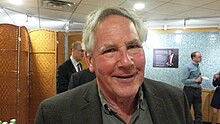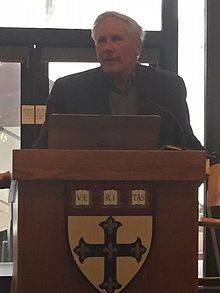Norman Daniels
Norman Daniels | |
|---|---|
 Norman Daniels at 5-22-2017 HCSPH Retirement Symposium | |
| Born | 1942 (age 81–82) New York |
| Nationality | American |
| Known for | A theory of justice which includes health possibilities and healthcare ethics |
| Awards | Investigator Award in Health Policy Research, Robert Wood Johnson Foundation[1] |
| Scientific career | |
| Fields | Global health, population health, health ethics, philosophy, ethics |
| Institutions | Tufts University, Tufts University School of Medicine, Harvard School of Public Health, Harvard University |

Norman Daniels (born 1942) is an American political philosopher and philosopher of science, political theorist, ethicist, and bioethicist at Harvard University and the Harvard T.H. Chan School of Public Health.[2] Before his career at Harvard, Daniels had built his career as a medical ethicist at Tufts University in Medford, Massachusetts, and at Tufts University School of Medicine, also in Boston.
Teaching positions
Until his retirement at the end of June 2017, Daniels is Mary B. Saltonstall Professor of Population Ethics and Professor of Ethics and Population Health[3] in the Department of Global Health and Population at the Harvard T.H. Chan School of Public Health in Boston.
Previously, and for 33 years, he had taught political philosophy at Tufts University in Medford, Massachusetts.[4][5] At Tufts University, he had been Goldthwaite Professor and chair of the philosophy department, and at Tufts University School of Medicine, he was professor of medical ethics (1969–2002).[6]
Education
- 1970 - Harvard University, Ph.D. (Philosophy), awarded the Plympton Dissertation Prize, 1971[7]
- 1966 - Balliol College, Oxford, B.A. (equivalent to M.A. in USA) (Philosophy and Psychology, First Honors)
- 1964 - Wesleyan University, B.A. (English, Summa cum Laude)
Personal life
Daniels is married to neuro-psychologist Anne Lacy Daniels (Ed.D.).[8] They have one son, Noah M. Daniels, formerly a postdoctoral research associate at MIT, is now Assistant Professor in the Department of Computer Science and Statistics of The University of Rhode Island.[9]
With Jared Israel, Daniels co-chaired the Harvard chapter of the Students for a Democratic Society in 1969.[10][11][12]
In a public letter to his fraternity brothers at Wesleyan, Daniels wrote: "At Harvard, I ended up co-chair of SDS and gave the speech on the steps of University Hall April 9, 1969, that began the take-over of that administration building and thus led to the Harvard Strike. I would have been fired as a teaching fellow, so I followed my advisors advice and quit that position to take a part-time job at Tufts, teaching philosophy of science and political philosophy. I stayed 33 years."[5]
Professional affiliations
- Formerly Goldthwaite Professor and chair of the philosophy department at Tufts University and professor of medical ethics at Tufts Medical School, 1969–2002
- Fellow, Hastings Center
- Member, Institute of Medicine
- Founding member of the National Academy of Social Insurance
- Member, International Society for Equity in Health
- Member, Medicare Coverage Advisory Commission (Bill Clinton administration)
- Member, Ethics Working Group of the Clinton White House Health Care Task Force (Spring 1993)
- Member, Advisory Board of the CIHR-Institute of Population and Public Health (Fall 2009)
- Member, Ethics Advisory Board of the Centers for Disease Control (Fall 2009 - Fall 2012)
- Member, Public Health Service Expert Panel on Cost Effectiveness and Clinical Preventive Medicine
- Member, National Academy of Social Insurance study panel on the social role of Medicare
- Member, Century Fund task force on Medicare reform
Consulting
- He has traveled widely and internationally, consulting with organizations, commissions, and governments in the U.S. and abroad on issues of justice and health policy
- Norman Daniels and Dan W. Brock consulted with Hillary Clinton on Bill Clinton's healthcare taskforce in 1993.
- Consultant, United Nations
- Consultant, World Health Organization
- President's Commission for the Study of Ethical Problems in Medicine
Awards
- Member, Institute of Medicine
- Fellow, The Hastings Center
- Founding Member, National Academy of Social Insurance
- Founding Member, International Society for Equity in Health
- Founding Member, National Cancer Policy Board, established by the Institute of Medicine and the Commission on the Life Sciences (served He served four years)
- Founding Member, Advisory Board of the Open Society Foundation project on Medicine as a Profession, and on the International Bioethics Advisory Board of PAHO. He served recently on an IOM Committee on the use of Cost Effectiveness Analysis in regulatory contexts.
Fellowships and grants
- Greenwall Foundation
- National Endowment for the Humanities
- National Institutes of Health
- National Library of Medicine
- National Science Foundation
- Retirement Research Foundation
- Robert Wood Johnson Foundation
- Investigator Award in Health Policy Research, Robert Wood Johnson Foundation, 1997 (for the period 1998-2001)
- "Limit-Setting in Managed Care and Other Health Delivery Systems: Legitimacy, Fair Process, and the Goals of Health Care Reform"[1]
- Rockefeller Foundation grant, international adaptation of the benchmarks
Books
- Thomas Reid's`Inquiry': the Geometry of Visibles and the Case for Realism (1974; Stanford, 1989)
- Reading Rawls: Critical Studies on Rawls' 'A Theory of Justice' (1975; Stanford, 1989)
- Just Health Care (Cambridge, 1985)
- Am I My Parents' Keeper? An Essay on Justice Between the Young and the Old (Oxford, 1988)
- Seeking Fair Treatment: From the AIDS Epidemic to National Health Care Reform (New York: Oxford University Press, 1995)
- Justice and Justification: Reflective Equilibrium in Theory and Practice (Cambridge University Press, 1996)
- (with Donald Light and Ronald Caplan) Benchmarks of Fairness for Health Care Reform (Oxford, 1996)
- (with Allen Buchanan, Dan Brock, and Dan Wikler) From Chance to Choice: Genetics and Justice. Cambridge University Press. ISBN 0-521-66977-4. (Cambridge, 2000)
- (with Bruce Kennedy and Ichiro Kawachi) Is Inequality Bad for Our Health? (Beacon Press, 2000)
- (with Harvard Medical School clinical ethicist and psychiatrist James E. Sabin, MD) Setting Limits Fairly: Can We Learn to Share Medical Resources? (Oxford, 2002;2nd ed., 2008; Published to Oxford Scholarship Online: September 2009) ISBN 9780195149364. DOI:10.1093/acprof:oso/9780195149364.001.0001
- Just Health: Meeting Health Needs Fairly (Cambridge, 2008).
See also
- American philosophy
- Clinton health care plan of 1993
- List of American philosophers
- List of Jewish American philosophers
- Thomas Reid, Scottish common sense realist
References
- ^ a b "Award page for RWJF Investigator Award in Health Policy Research". Archived from the original on 2016-11-12. Retrieved 2014-09-22.
- ^ HSPH faculty profile
- ^ Norman Daniels, Faculty Directory, Department of Global Health and Population
- ^ Justice, Health, and Healthcare, an article on political and social justice vis a vis access to healthcare, while Norman Daniels taught at Tufts
- ^ a b Bios_63-64 htm
- ^ Faculty Associates of the Edward J. Safra Center for Ethics at Harvard, noting some of the topical areas which Dr. Daniels researches
- ^ Biosketch: Norman Daniels, personal homepage
- ^ Health Providers Data for Anne Lacy Daniels, EdD
- ^ MIT CSAIL profile for Noah M. Daniels, PhD
- ^ Robert M. Smith (May 2, 1969). "169 Fined in Harvard Sit-In; 2 Cleared at Cambridge". The New York Times. Retrieved February 9, 2009.
- ^ "70 Youths Ejected In Protest on Draft At House Building". The New York Times. May 9, 1967. Retrieved February 9, 2009.
- ^ Alexander Reid (April 9, 1989). "Harvard, Ex-Radicals Remember Many Talk of Feelings 20 Years After Protest". The Boston Globe. Archived from the original on October 23, 2012. Retrieved February 9, 2009.
External links
- HSPH Faculty Site for Prof. Norm Daniels
- Publications of Prof. Norm Daniels
- 'Norman Daniels Symposium' lectures/papers presented published in the Journal of Medical Ethics (January 2009, Volume 35, Number 1), published by British Medical Journal and the Institute of Medical Ethics
- HSPH-sponsored personal Faculty website for Prof. Norman O. Daniels, PhD
- 1942 births
- Living people
- American ethicists
- Harvard University alumni
- Wesleyan University alumni
- Alumni of Balliol College, Oxford
- Harvard School of Public Health faculty
- Hastings Center Fellows
- American political philosophers
- Social philosophers
- Epistemologists
- Tufts University School of Medicine faculty
- American philosophers
- Tufts University faculty
- Harvard University faculty
